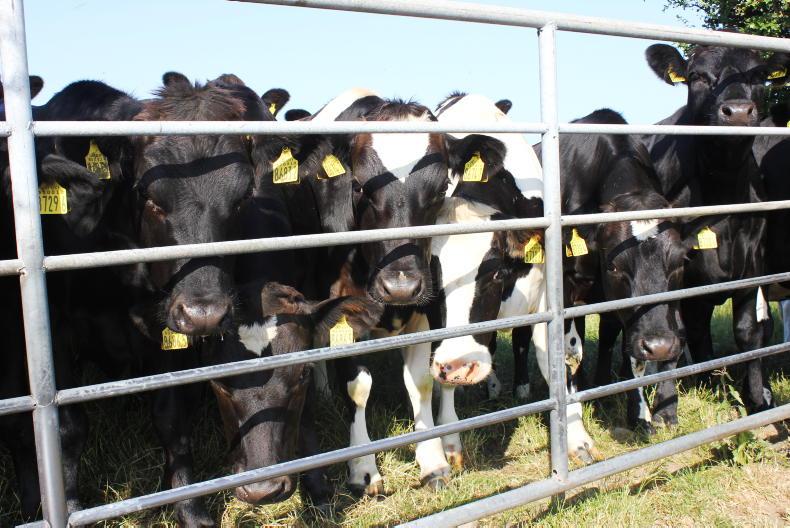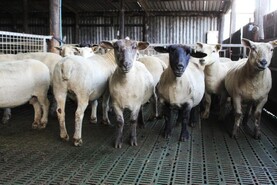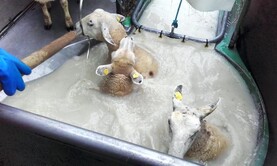For years now, agriculture has had to constantly reinvent itself to counteract a scarcity of manual labour.
This was mostly achieved by increased mechanisation, and by those same machines becoming bigger and bigger.
Probably the best example is silage making, with equipment nowadays that wouldn’t be out of place on the plains of America. However, the steady strangulation of older methods in favour of ‘efficiency’ can only be taken so far before saturation point is reached.
Most of us only become aware of any problem when it lands on our doorstep, and this farm has suddenly been hit with several working examples of an overstretched system.
For a long time, the standard way to prepare poultry houses for day-old chicks was to get two of them ready, then double brood the birds for five or six weeks before thinning them across into the other pair of units. This created time for the last two houses to be worked at, without the stress of having to work at all four at once.
However, the transport company that move pullets, old hens, and provide this thinning service has lost a sizable percentage of its workers and can no longer guarantee that this task is available.
Long hours
In addition, rumours suggest that the remaining workforce are working 70-hour weeks. Moving and working with brown birds is a dusty, dirty, heavy job, and probably isn’t anyone’s dream career. But someone’s gotta do it.
That same firm is struggling to find drivers, as are most transport companies. The problem here becomes apparent when you look at the nature of the work. There is lorry driving, and there is lorry driving.
A lot of young men find the lure of cross-channel, motorway driving a lot more attractive than driving a blower lorry onto farms, where you’re likely to be laying your pipes across a generous layer of cow dung before attaching to the meal bin.
Most of us only become aware of any problem when it lands on our doorstep, and this farm has suddenly been hit with several working examples of an overstretched system
And not all farms are a particularly welcoming environment for lorry men either – just ask one of the drivers if all the farmers make their jobs easy or not. The boss of the firm that delivers chicken meal here used to spend most of his day in the office – currently he is in the lorry full-time due to an unavailability of drivers.
There is a rumour that some of the local agricultural haulage companies have recently introduced a blanket rise of £100 per week, purely as a sweetener to retain staff.
Shearing
Sheep shearing is another facet of this farm that knows all about a scarcity of labour. Twenty years ago, the prospect of having no local shearers would have been unthinkable, but all that has changed. The pair of boys that clipped here for years are nearing the end of their careers (once you get to the wrong side of 50, your shearing days are numbered), and for a while it looked like one of them would have to do a season on his own.
In the end, he managed to locate someone, and things turned out well, but the shocking fact is that this part of Co Down does not have younger people wanting to clip sheep for a living.
The only logical solution I can foresee is a lucrative pay packet that matches or surpasses all those other methods of employment
I spoke to a few Mourne men at the start of the season, expecting them to rhyme off a list of keen young things that were frothing at the mouth to get at it, but they said that exactly the same thing is happening in their part of the world.
Reasons
Depending on who you ask, the reasons for this labour shortage are wide and varied. Some say Brexit, others claim young folk can earn a living more easily the further they venture from the agricultural world.
Improving economies in eastern Europe are also frequently mentioned as a magnet for drawing people back to their birthplace, while the most common excuse from my ‘cynical farmer’ poll is that “The young yins dinnae want to work nooadays. That oul furlong scheme has them ruined.”
Perhaps there is an element of truth in all these rationales, but whatever the reason, it is a very real problem that needs to be addressed. And the only logical solution I can foresee is a lucrative pay packet that matches or surpasses all those other methods of employment.
That, in turn, can only mean one thing – food prices will have to rise so that more money is available for every cog in the agricultural wheel.
Read more
Farmer Writes: grassland theory versus practical reality
Easiest silage season in living memory
For years now, agriculture has had to constantly reinvent itself to counteract a scarcity of manual labour.
This was mostly achieved by increased mechanisation, and by those same machines becoming bigger and bigger.
Probably the best example is silage making, with equipment nowadays that wouldn’t be out of place on the plains of America. However, the steady strangulation of older methods in favour of ‘efficiency’ can only be taken so far before saturation point is reached.
Most of us only become aware of any problem when it lands on our doorstep, and this farm has suddenly been hit with several working examples of an overstretched system.
For a long time, the standard way to prepare poultry houses for day-old chicks was to get two of them ready, then double brood the birds for five or six weeks before thinning them across into the other pair of units. This created time for the last two houses to be worked at, without the stress of having to work at all four at once.
However, the transport company that move pullets, old hens, and provide this thinning service has lost a sizable percentage of its workers and can no longer guarantee that this task is available.
Long hours
In addition, rumours suggest that the remaining workforce are working 70-hour weeks. Moving and working with brown birds is a dusty, dirty, heavy job, and probably isn’t anyone’s dream career. But someone’s gotta do it.
That same firm is struggling to find drivers, as are most transport companies. The problem here becomes apparent when you look at the nature of the work. There is lorry driving, and there is lorry driving.
A lot of young men find the lure of cross-channel, motorway driving a lot more attractive than driving a blower lorry onto farms, where you’re likely to be laying your pipes across a generous layer of cow dung before attaching to the meal bin.
Most of us only become aware of any problem when it lands on our doorstep, and this farm has suddenly been hit with several working examples of an overstretched system
And not all farms are a particularly welcoming environment for lorry men either – just ask one of the drivers if all the farmers make their jobs easy or not. The boss of the firm that delivers chicken meal here used to spend most of his day in the office – currently he is in the lorry full-time due to an unavailability of drivers.
There is a rumour that some of the local agricultural haulage companies have recently introduced a blanket rise of £100 per week, purely as a sweetener to retain staff.
Shearing
Sheep shearing is another facet of this farm that knows all about a scarcity of labour. Twenty years ago, the prospect of having no local shearers would have been unthinkable, but all that has changed. The pair of boys that clipped here for years are nearing the end of their careers (once you get to the wrong side of 50, your shearing days are numbered), and for a while it looked like one of them would have to do a season on his own.
In the end, he managed to locate someone, and things turned out well, but the shocking fact is that this part of Co Down does not have younger people wanting to clip sheep for a living.
The only logical solution I can foresee is a lucrative pay packet that matches or surpasses all those other methods of employment
I spoke to a few Mourne men at the start of the season, expecting them to rhyme off a list of keen young things that were frothing at the mouth to get at it, but they said that exactly the same thing is happening in their part of the world.
Reasons
Depending on who you ask, the reasons for this labour shortage are wide and varied. Some say Brexit, others claim young folk can earn a living more easily the further they venture from the agricultural world.
Improving economies in eastern Europe are also frequently mentioned as a magnet for drawing people back to their birthplace, while the most common excuse from my ‘cynical farmer’ poll is that “The young yins dinnae want to work nooadays. That oul furlong scheme has them ruined.”
Perhaps there is an element of truth in all these rationales, but whatever the reason, it is a very real problem that needs to be addressed. And the only logical solution I can foresee is a lucrative pay packet that matches or surpasses all those other methods of employment.
That, in turn, can only mean one thing – food prices will have to rise so that more money is available for every cog in the agricultural wheel.
Read more
Farmer Writes: grassland theory versus practical reality
Easiest silage season in living memory






 This is a subscriber-only article
This is a subscriber-only article











SHARING OPTIONS: